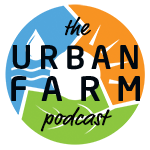721: Mike Smith on a Demonstration Organic Farm.
Teaching people of all backgrounds about sustainably growing food (at the Guelph Centre for Urban Organic Farming).
In This Podcast:
Mike Smith studied political science with the intention of changing agricultural policy and making a difference from the top down. As important as that is, he eventually discovered that he could make a bigger impact on the ground – literally, with his hands in the earth. Now he works at the Guelph Centre for Urban Organic Farming in Canada, actually growing food and teaching others how to do the same. In this episode, Mike talks about the positive impact this has had on his life and on the local food economy.
Our Guest:
 Mike Smith manages day-to-day farm operations, including planning and preparing materials for the cropping season, at the Guelph Centre for Urban Organic Farming, a one-hectare (that is 2.47 acres) learning and research facility within the Department of Agriculture at the University of Guelph. Here he works with stakeholders, recruits staff, supervises interns and volunteers, and plays a key role in enhancing educational and outreach activities. Mike received his B.A. in political science with a focus in agricultural policy from McMaster University and post-graduate certificate in project management from the University of Toronto. His education and experience give him a solid background in organic vegetable production, from planting to post-harvest activities, which he is using to impact the community.
Mike Smith manages day-to-day farm operations, including planning and preparing materials for the cropping season, at the Guelph Centre for Urban Organic Farming, a one-hectare (that is 2.47 acres) learning and research facility within the Department of Agriculture at the University of Guelph. Here he works with stakeholders, recruits staff, supervises interns and volunteers, and plays a key role in enhancing educational and outreach activities. Mike received his B.A. in political science with a focus in agricultural policy from McMaster University and post-graduate certificate in project management from the University of Toronto. His education and experience give him a solid background in organic vegetable production, from planting to post-harvest activities, which he is using to impact the community.
Listen in and learn about:
-
- Working on an organic farm to avoid signing some questionable waivers
- Mentoring 70 young people to grow crops organically and run a small farm business
- The simple reason why urban farming is important
- “We all eat.”
- BS in politics, BS in agriculture
- The differences between working in policy (top down) and working on the ground (bottom up)
- Arugla through Zucchini – what’s growing in the 2.5 acres at the Guelph Centre
- Diversity is the best crop insurance.
- Partnering with hospitality services to distribute the food on campus
- They harvest thousands of pounds a year.
- Season extension methods used – hoophouses and floating row covers
- Visitors’ reactions and questions
- Collaborating rather than competing – everyone wins
- The value of making it fun (with a fun example!)
As well as:
His failure – Miscommunicating his expectations not once, but twice, and learning something he wouldn’t otherwise have learned.
His success – Mentoring over 70 young people, many of them going on to start their own small farm business
His drive – The connection with people and the natural world
His advice – “Before you go all in, try to have an experience growing in a wet year and in a dry year.”
Mike’s Book recommendation:
Greenhouse and Hoophouse Growers Handboook: Organic Vegetable Production Using Protected Culture by Andrew Mefferd
How to reach Mike:
Email: gcuof@uoguelph.ca
Instagram: @gcuof_uofg
UrbanFarm.org/Guelph
*Disclosure:
Some of the links in our podcast show notes and blog posts are affiliate links and if you go through them to make a purchase, we will earn a nominal commission at no cost to you. We offer links to items recommended by our podcast guests and guest writers as a service to our audience and these items are not selected because of the commission we receive from your purchases. We know the decision is yours, and whether you decide to buy something is completely up to you.






